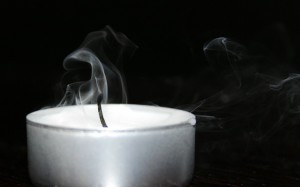There’s nothing more enjoyable (well, at least it sits towards the top of our list!) than coming home on a spring evening and lighting up some amazingly scented candles. As the fragrance fills the air at home, you feel a sense of comfort and peace. But what are these fragrances and candles made of? Are they actually as good for our health as they make us feel? Where does this waxy substance come from and how are these fragrances manufactured? You may be surprised to learn that some candles emit a shocking amount of toxins into the air despite their pleasant aroma!
What Are Candles?
A candle is a block or cylinder of wax with a wick that is burnt to emit light, and in recent times, a pleasant smell. The wax used can come from a number of sources but in today’s modern times, generally it is sourced from paraffin wax, beeswax or soy based wax.
In older times, it was used as a source of light but with today’s technology and the development of electricity, its use has evolved for celebrations and as an accessory rather than a necessity.
You can read more about the history of candles on the National Candle Association website.
So What’s Wrong with Candles?
Paraffin Wax
One of the issues with candles is that most common candles are made from paraffin. Paraffin is a waxy by-product from petroleum and is used in candles as well as other applications, such as some beauty products. When burned, this wax releases carcinogens and soot into the air that we breath. The same fumes as those found in diesel fuel fumes!
Wick
When buying a candle, be aware to pick one which has a lead-free wick. Some candle wicks contain lead or other heavy metals which are released when burnt. Lead-core wicks can release up to 5 times the amount of lead considered hazardous for children and exceeds EPA polution standards for outdoor air (quoted from GreenAmerica.org).

Scent
Recently, research has found that certain scents used in candles can actually be releasing formaldehyde into the air. Specifically, the ingredient limonene, which is used for citric smells.
While naturally it is deemed safe, when released into the ozone, it reacts creating formaldehyde.
So what can you do?
Ideally, stay away from paraffin candles and any candles that lists lead as a component of the wick. You can still enjoy a nice scented candle but when you’re shopping for them, look out for alternatives such as soy candles.
Have you had a negative experience with candles? What is your favourite alternative to the conventional standard candles?









One Response
handmade soy candles
Awesome post! Great job, I read your blog
occassionally and you’re always creating
some of the best stuff. I shared this with my
followers on facebook and my followers loved it!
Keep up the good work